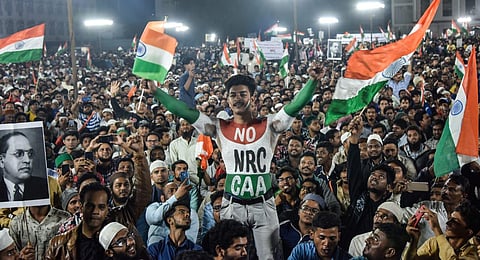

NEW DELHI: While the National Population Register (NPR) has been prepared before in 2010, the additional criteria in the pre-test ahead of next year's exercise are what makes it controversial.
Unlike in 2010, when it was prepared for the first time, the pre-test of the NPR conducted earlier this year sought details of birthplaces of parents -- a clear link between it and the contentious National Register of Citizens (NRC).
While announcing the Union Cabinet’s decision approving Rs 3,941.35 crore for updation of the NPR on Tuesday, Union Minister Prakash Javadekar had said it was no different than the one conducted in 2010 by the UPA government but the pre-test does not bear him out. Besides the birthplace of parents, the other controversial heads which were there in the NPR pre-test were the last place of residence, Aadhaar ID, driving licence, voter ID and mobile number.
According to the Citizenship Rules, NPR is compulsory and providing any false information in NPR "shall be punishable with fine which may extend to one thousand rupees."
The schedule of NPR 2010—which is available on the Census website—shows 14 question heads such as name, relationship to head of household, father's name, mother's name, spouse's name (if married), sex, date of birth, marital status, place of birth, nationality (as declared), present address of usual residence, duration of stay at present address, permanent residential address, occupation, and educational qualification.
During August-September, the NPR pre-test was conducted in some districts of Delhi, Uttar Pradesh, Rajasthan, Bihar, West Bengal, Jharkhand, Odisha, Chhattisgarh, Madhya Pradesh, Gujarat, Assam, Sikkim, Arunachal Pradesh, Nagaland, Manipur, Mizoram, Tripura, Meghalaya, Daman and Diu, Dadra and Nagar Haveli, Maharashtra, Chandigarh, Jammu and Kashmir, Himachal Pradesh, Punjab, Uttarakhand, Karnataka, Goa, Lakshadweep, Kerala, Tamil Nadu, Puducherry, Andaman and Nicobar, Telangana and Andhra Pradesh. The pre-test is a recce of the final exercise.
The NPR is a register of usual residents of the country. It is being prepared at the local (village/sub-town), subdistrict, district, state and national level under provisions of the Citizenship Act, 1955 and the Citizenship (Registration of Citizens and Issue of National Identity Cards) Rules, 2003. The actual exercise to update the NPR would be held between April and September 2020 in all states and Union Territories. The NPR was last conducted in 2010 before the 2011 Census.
The difference between NPR 2010, which was conducted during the UPA’s tenure, and the upcoming NPR has been pointed out by Congress leaders too, some of whom have put out NPR 2020 forms that were used in the pretest. Former Minister of State for Home Affairs Ajay Maken tweeted the forms of both NPR 2010 and NPR 2020 on Wednesday saying, “As MOS Home in 2010, I supervised the NPR! But Modi-Shah 2020 NPR is Totally Different. Please see 2010 & 2020 NPR Forms.”
Congress leader Manish Tewari also took to Twitter on Wednesday morning and alleged that the BJP is smuggling elements of the NRC into the NPR. He shared the picture of an NPR form and highlighted the box that asks applicants if their parents were born in India. Tewari also accused the government of using NPR’s details as raw data for the NRC.
The Citizenship Rules 2003, on the basis of which the NPR will be carried out, also establishes it as the precursor to NRC. Several government documents too have described the NPR as the first step to the NRC, which critics say is anti-Muslim in the context of the recently passed Citizenship Amendment Act 2019.
Work on the NPR had already started in some states but, amid fears that it would be used to create an India-wide NRC and exclude Muslim citizens, West Bengal and Kerala have put the brakes on the exercise.